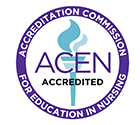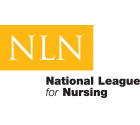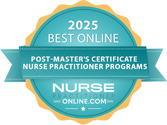Online Post-Master’s Certificate in Nursing
Overview
Across the country, a national shortage of primary care providers has set the stage for RNs to advance. As more states certify nurse practitioners as advanced care providers, you can pursue a new avenue of nursing to fill meaningful voids in today’s health systems.
At Regis College, you can earn a post-master’s certificate online to not just prepare for advancement in nursing, but to also expand services as a health care provider.
Choose Your Track
Entry One: Have an MSN? Become an NP.
Choose this track if you are anMSN-prepared RN looking to advance your nursing career by becoming a nurse practitioner.
- Complete your Post-Master’s Nurse Practitioner Certificate in as few as 18 months.
- Choose from six NP specializations and qualify to sit for exams to become a certified NP in Pediatrics, Family, Women’s Health, Psychiatric Mental Health, Adult Gerontology – Primary Care, and Adult Gerontology – Acute Care.
- Students are eligible to transfer maximum credit hours from their prior MSN.
Entry Two: Already an NP? Expand Your Practice.
Choose this track if you are an MSN-prepared NP looking to expand your area of practice by adding an additional NP specialty.
- Complete your Post-Master’s Nurse Practitioner Certificate in as few as 14 months.
- Choose from six NP specializations to expand your NP practice into Pediatrics, Family, Women’s Health, Psychiatric Mental Health, Adult Gerontology – Primary Care, and Adult Gerontology – Acute Care.
- Students are eligible to transfer maximum credit hours from their prior MSN.
Calendar
Entry One (MSN-prepared RN)
Credits: 30-42
Courses: 11-13
Duration: 18-22 months
Entry Two (MSN-prepared NP)
Credits: 21-42
Courses: 11-13
Duration: 14-22 months
Application Deadline:
March 23, 2026
Upcoming Start Date:
May 4, 2026
Why Choose Regis for Your Online Post-MSN Certificate?




Online Post-Master’s Certificate in Nursing Specializations
Choose from 6 NP Certificate Specializations
Adult Gerontology – Primary Care Nurse Practitioner (AGPCNP)
Learn to provide primary care related to chronic illness and aging, including polypharmacy management and end-of-life considerations. Formerly referred to as “AGNP”.
Adult Gerontology – Acute Care Nurse Practitioner (AGACNP)
Learn to diagnose and treat critical medical conditions in adults in an acute, inpatient care setting. Learn advanced diagnostics, pathophysiology, and more.
Pediatric Nurse Practitioner (PNP)
Focus on a variety of health needs and issues in an outpatient, primary care pediatric setting.
Family Nurse Practitioner (FNP)
Develop skills and knowledge to work with every age in a family practice environment.
Psychiatric Mental Health Nurse Practitioner (PMHNP)
Provide care to mental health clients across the lifespan using contemporary psychotherapy modalities and knowledge of psychopharmacology.
Women’s Health Nurse Practitioner (WHNP)
Learn to care for women at all life stages, including primary care, gynecological, and obstetrical health care needs.
Qualify to Sit for NP Certification Exams
Completing the online post-master’s certificate can help you sit for exams from the following certification boards:
- American Nurses Credentialing Center
- American Association of Nurse Practitioners
- National Certification Corporation
- Pediatric Nursing Certification Board
WATCH THE VIDEO:
WEBINAR:






Online Post-Master's Certificate - NP Careers
Between 2019 and 2029, the number of nurse practitioner jobs is projected to increase by 45%. In addition to more job opportunities, NPs can also prepare for higher earnings. The average nurse practitioner earned $111,680 in 2020.*
More than 89% of licensed NPs are certified in at least one area of primary care, according to the American Association of Nurse Practitioners. While we face evolving challenges to our health care system due to the recent pandemic and as patient populations swell, so does the need for more licensed nurse practitioners. MSN-credentialed nurses are able to prepare to emerge as NPs through programs that can be completed in less time, such as the online Post-Master’s Certificate at Regis College. These nursing leaders are gaining greater control in their practice as full prescriptive authority expands across the nation, are positioned for high-level positions, and specialize in areas that allow them to work with a variety of unique patient populations.
As a Nurse Practitioner, You May Have Career Opportunities Such As:
Psychiatric Mental Health NP
Median wage: $111,660**
As a PMHNP, you’ll intersect with the roles of psychologists, social workers, and psychiatrists, providing patient care to those with mental and psychiatric health issues, as well as substance abuse issues. PMHNPs also work with the families of their patients and educate communities to decrease the stigma surrounding mental health.
Employers often include:
- Mental health clinics
- Hospitals
- Rehab facilities
Adult Gerontology – Primary Care NP
Median Wage: $90,840**
Provide primary care to adults, including geriatric patients, to help them manage and overcome various conditions and illnesses. With a focus on patient wellness and promoting healthy choices, primary care AGNPs (AGACNP) may also manage transitions between care settings and often provide caregiver education and evaluation. They often work in long-term care settings and clinics throughout the community or may have their own private practice.
Employers often include:
- Long-term care facilities
- Hospices
- Primary care practices
Pediatric Nurse Practitioner
Median wage: $91,385**
Provide specialized primary care to newborns, infants, toddlers, adolescents, and young adults. PNPs diagnose illnesses, prescribe medication, and perform annual checkups, in addition to ordering patient testing, and consulting with clients and their family members.
Employers often include:
- Pediatric offices
- Specialty clinics
- School-based health centers
Family Nurse Practitioner
Median wage: $96,289**
Provide care to patients of all life stages in collaboration with health care teams and develop relationships with entire family units. FNPs conduct health assessments and tests, and provide preventive care, disease management, treatment of chronic and acute illnesses, and may even prescribe medication.
Employers often include:
- Physician’s offices
- Hospitals
- Community health centers
Women’s Health Nurse Practitioner
Median wage: $93,463**
Deliver comprehensive health care to women throughout their lifespan in areas pertaining to women’s health care needs, including obstetrics, gynecology, urogynecology, gynecologic oncology, infertility, and maternal/fetal medicine. WHNPs screen women for health concerns such as STIs, cancers, heart disease, diabetes, depression, and domestic abuse. They also educate women of all ages on wellness and nutrition topics.
Employers often include:
- OB-GYN clinics
- Family planning clinics
- Women’s prisons
Adult Gerontology – Acute Care NP
Median wage: $96,063**
Diagnose and treat medical conditions in adults and gerontology patients who have critical illnesses, physiological instability, dependency on technology, or a vulnerability to complications, in collaboration with physicians and other members of the health care team. While most AGACNPs report practicing in tertiary care settings, they can now work in specialty clinics and long-term care facilities.
Employers often include:
- Emergency rooms
- Intensive care
- Trauma or acute care units
**Payscale.com
Ready for Your Next Step?
Online Post-Master's Certificate in Nursing Curriculum
Experience an Expertly Crafted Curriculum Taught by Our Supportive Faculty.
Have an MSN? Become an NP.
- Master of Science in Nursing degree from a regionally accredited institution and accredited program
- Active unencumbered RN license
- Students are eligible to transfer maximum credit hours from their prior MSN.
Already an NP? Expand Your Practice
- Master of Science in Nursing degree from a regionally accredited institution and accredited program
- Active unencumbered RN license
- Proof of NP certification
- Students are eligible to transfer maximum credit hours from their prior MSN
Core Courses Include:
Entry One: MSN Non-NP Courses
Pediatric (PNP) Certification
Family (FNP) Certificate
Psychiatric Mental Health (PMHNP) Certificate
Women's Health (WHNP) Certificate
Adult Gerontology - Primary Care (AGPCNP) Certificate*
Adult Gerontology - Acute Care (AGACNP) Certificate
Entry Two: MSN NP to NP Courses
Pediatric (PNP) Certificate
Family (FNP) Certificate
Psychiatric Mental Health (PMHNP) Certificate
Women's Health (WHNP) Certificate
Adult Gerontology - Primary Care (AGPCNP) Certificate*
Adult Gerontology - Acute Care (AGACNP) Certificate
Admission Requirements
Registered Nurse with a Master of Science in Nursing Degree Entry:
- Master of Science in Nursing degree from a regionally accredited institution and accredited program
- Minimum 3.0 cumulative GPA preferred
- Active unencumbered RN license
- Students are eligible to transfer maximum credit hours from their prior MSN.
- One year of critical care work experience (for AGACNP program only)
Certified Nurse Practitioner with a Master of Science in Nursing Degree Entry:
- Master of Science in Nursing degree from a regionally accredited institution and accredited program
- Minimum 3.0 cumulative GPA preferred
- Active unencumbered RN license
- NP board certificate
- Students are eligible to transfer maximum credit hours from their prior MSN
- One year of critical care work experience (for AGACNP program only)
Application Requirements
- Application form
- Proof of active unencumbered RN license
- Official transcripts from all post-secondary institutions
- Current resume
- Statement of purpose
- Two letters of recommendation
Additional application requirements for master’s-prepared NPs:
- Copy of NP Board Certificate
- Copy of DEA, if applicable
- APRN state licensure
- Prescriptive authority
- Clinical logs
About Regis

Frequently Asked Questions
Regis is a leading Catholic university in Greater Boston that has been preparing students for success since 1927 through cutting-edge technology and industry-focused curriculum that continues to evolve to meet the ever-changing needs of health care in a wide variety of high-demand and niche specializations.
Our distinguished and personable faculty provide a supportive, values-based nursing education integrated with a focus on holistic patient-centered care. Our online Post-Master’s Certificate NP program incorporates insider perspectives on leadership qualities to help you build the skills you’ll need to positively affect the field.
NPs have greater control over their professional practice and patient outcomes and may benefit from competitive salaries. Many NPs practice independently in some states with prescriptive authority and are being granted more autonomy nationwide.
Additionally, the health care industry is facing a nationwide shortage of physicians and a rising need for primary care, particularly throughout the pandemic. Preparing to become an NP helps nurses hone their skills to deliver the best patient care and outcomes in an industry that continually emphasizes the need to attain ongoing and advanced education.
The program allows two points of entry:
- MSN-prepared RN, looking to advance their nursing career by becoming a nurse practitioner
- MSN-prepared NP, looking to expand their area of practice by adding an additional NP specialty
Depending on your entry point, you may complete your online Post-Master’s Certificate in as few as:
18-22 months – MSN RN to NP
14-22 months – MSN NP to NP (second NP specialization)
Post-Master’s Certificate courses range between 8-16 weeks in length and are offered throughout the Spring, Summer, and Fall semesters.
*Final curriculum will be decided on individual basis, including potential transfer credits
Depending on your entry point and chosen specialization, the amount of credits earned through the online Post-Master’s Certificate may vary:
MSN RN to NP: 30-39 credits/PMHNP 33-42 credits
MSN NP to NP (second NP specialization): 21-39 credits/PMHNP 24-42 credits
Cost Per Credit Hour:
- $1025 per credit hour
Application fee: $75
More information about online graduate nursing program tuition and fees, financial aid, payment options, etc., can be found here.
Regis is proud to offer a 10% tuition discount on fully online programs for employees, members, and spouses of employees of our partner organizations.
Regis College aims to help military, veterans, and their families to further their education. This is why we offer a 15% tuition discount to all active and reserve military, veterans, and military spouses for our online programs.
We’re also pleased to offer 15% off tuition on online programs to all federal government employees, and their spouses, working in any federal department.
A 10% Alumni discount is available to anyone who has graduated from Regis with a degree, excluding those who only received a certificate from Regis.
*Some exceptions apply. The Regis partnership discount cannot be combined with any other discount or scholarship offered by Regis.
Online Nursing Certificate Program Resources

What You Can Expect When Taking Nursing Classes Online
Taking nursing classes online can allow nurses to earn their post-master’s nursing certificates without compromising their work-life balance.

9 Essential Qualities of Nurse Leadership
he health care field grows more complex as nurse leaders brace for a mass exodus of retiring registered nurses and an influx of fresh, green talent.

NP Program Options: Online Post-Master’s Certificate in Nursing
Looking for ways to pursue a post-master’s education in nursing? Find out how an NP program can help you advance your career in the nursing profession.

What Are the Benefits of Nursing Certification?
While becoming licensed is a requirement for nurses to work in a particular state, certification is a type of add-on that’s valued by nurses, their employer, and their patients.

What Is a Family Nurse Practitioner?
What is a family nurse practitioner? Learn what family nurse practitioners do, the critical skills they develop, and how to enter this rewarding profession.
Tuition and Fees
$1025
Per credit hour
$165
Nursing clinical fee for Castle Branch
Ways to Save on Your Tuition

Regis partner employees can receive a discount on their tuition. Find out if your employer is a partner.

Federal government employees as well as active and reserve military and veterans are eligible for a 15% discount on tuition. Find out more.

Regis alumni who have received a previous degree from Regis are eligible for a 10% discount on tuition. Speak to an advisor for more information.

We are here to support you through the process. Speak to an advisor to learn more.

Earn financial aid helping fellow students while also gaining valuable professional skills. Get more details.
Related Programs

Online MSN to Doctor of Nursing Practice

Online Master of Science in Nursing
